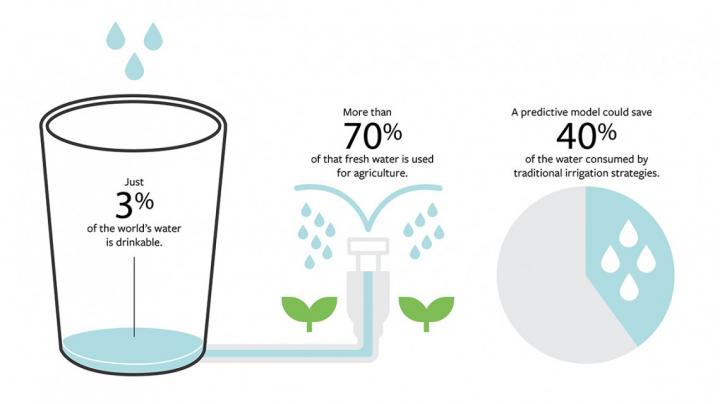
Credit: Cornell University
ITHACA, N.Y. – Fresh water isn’t unlimited. Rainfall isn’t predictable. And plants aren’t always thirsty.
Just 3 percent of the world’s water is drinkable, and more than 70 percent of that fresh water is used for agriculture. Unnecessary irrigation wastes huge amounts of water – some crops are watered twice as much as they need – and contributes to the pollution of aquifers, lakes and oceans.
A predictive model combining information about plant physiology, real-time soil conditions and weather forecasts can help make more informed decisions about when and how much to irrigate. This could save 40 percent of the water consumed by more traditional methods, according to new Cornell University research.
“If you have a framework to connect all these excellent sources of big data and machine learning, we can make agriculture smart,” said Fengqi You, energy systems engineering professor.
You is the senior author of “Robust Model Predictive Control of Irrigation Systems With Active Uncertainty Learning and Data Analytics,” which published in IEEE Transactions on Control Systems Technology. The paper was co-authored with Abraham Stroock, professor of chemical and biomolecular engineering, who is working on water conservation strategies with apple farmers in New York state and almond, apple and grape growers in drought-ridden regions of the West Coast.
“These crops, when grown in the semiarid, semidesert environment of California’s Central Valley, are huge consumers of water – one gallon of water per almond,” Stroock said. “So there’s a real opportunity to improve the way we manage water in these contexts.”
Controlling plant moisture precisely could also improve the quality of sensitive specialty crops such as wine grapes, he said.
The researchers’ method uses historical weather data and machine learning to assess the uncertainty of the real-time weather forecast, as well as the uncertainty of how much water will be lost to the atmosphere from leaves and soil. This is combined with a physical model describing variations in the soil moisture.
Integrating these approaches, they found, makes watering decisions much more precise.
Part of the challenge of the research is identifying the best method for each crop, and determining the costs and benefits of switching to an automated system from a human-operated one. Because apple trees are relatively small and respond quickly to changes in precipitation, they may not require weeks or months of weather data. Almond trees, which tend to be larger and slower to adapt, benefit from longer-term predictions.
“We need to assess the right level of complexity for a control strategy, and the fanciest might not make the most sense,” Stroock said. “The experts with their hands on the valves are pretty good. We have to make sure that if we’re going to propose that somebody invest in new technology, we’ve got to be better than those experts.”
###
First author of the paper is Chao Shang, a former postdoctoral at Cornell and now an assistant professor of automation at Tsinghua University. The research was partly funded by the Cornell Initiative for Digital Agriculture.
Cornell University has dedicated television and audio studios available for media interviews supporting full HD, ISDN and web-based platforms.
Media Contact
Lindsey Hadlock
[email protected]
Original Source
http://news.
Related Journal Article
http://dx.



